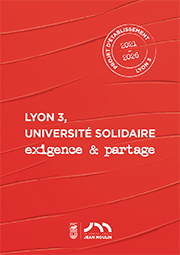AccueilRechercheProgrammes et productions scientifiquesThèsesThèses soutenuesThèses soutenues - 2006-2021Thèses soutenues - 2018
-
Partager cette page
- Recherche,
AYARI Zied
L’obligation démocratique en droit international
Publié le 30 janvier 2020 – Mis à jour le 30 janvier 2020
Thèse en Droit, soutenue le 11 décembre 2018.
La démocratie est généralement abordée par la doctrine en droit international comme une valeur politique ayant des influences plus ou moins importantes sur le droit international depuis la fin de la guerre froide. Cette étude traite la démocratie comme le contenu d’une obligation internationale adressée aux ?tats pour mettre en place un système politique basé sur des élections libres et honnêtes, le respect des droits politiques et l’instauration d’un ?tat de droit. Ce trépied forme les éléments constitutifs de l’obligation démocratique et lui donne une structure composite. L’approche choisie part de l’étude du cycle de vie de cette obligation en droit international qui comprend deux phases principales : le processus de formation de l’obligation démocratique et les effets qu’elle génère.
S’agissant du processus de formation, il inclut plusieurs étapes allant de la gestation de l’obligation démocratique jusqu'à sa formalisation par les modes formels de production des normes en droit international. En effet, cette obligation n’a pas pris forme dans l’ordre juridique international tel le big bang, mais a suivi une évolution déterminée.
En ce qui concerne les effets générés par l’obligation démocratique, ils ont une double nature : directs et indirects. Les premiers sont normativement attachés à l’obligation dans le sens qu’ils créent un devoir juridique à la charge des ?tats pour mettre en place un gouvernement démocratique et déclenchent la mise en ?uvre de la responsabilité internationale de ceux qui ne s’y conformeraient pas. Les seconds sont d’odore systémique et assurent l’applicabilité sociale de l’obligation démocratique en influant sur les dimensions institutionnelle et relationnelle de la société internationale.
Since the end of the Cold War, the mainstream scholars approach democracy as a political value which influences international law. This study analyse democracy as the content of an international obligation addressed to States to establish a political system based on free and fair elections, respect of political rights and the establishment of the rule of law. This tripod forms the constituent elements of the democratic obligation and gives it a composite structure. The chosen approach starts from the study of the obligation life cycle in international law, which comprises two main phases: the law making process of the democratic obligation and its effects.
The law making process includes several stages ranging from the gestation of the democratic obligation to its formalization by the formal modes of production of norms in international law. Indeed, this obligation did not take form in the international legal order such as the big bang, but followed a determined evolution.
As for the effects generated by the democratic obligation, they have a dual nature: direct and indirect. The direct effects are normatively attached to the obligation in the sense that they create a legal duty addressed to States to establish a democratic government and trigger the implementation of the international responsibility of those who do not comply with it. The indirect effects have a systemic nature and ensure the social applicability of the democratic obligation by influencing the institutional and relational dimensions of international society.
S’agissant du processus de formation, il inclut plusieurs étapes allant de la gestation de l’obligation démocratique jusqu'à sa formalisation par les modes formels de production des normes en droit international. En effet, cette obligation n’a pas pris forme dans l’ordre juridique international tel le big bang, mais a suivi une évolution déterminée.
En ce qui concerne les effets générés par l’obligation démocratique, ils ont une double nature : directs et indirects. Les premiers sont normativement attachés à l’obligation dans le sens qu’ils créent un devoir juridique à la charge des ?tats pour mettre en place un gouvernement démocratique et déclenchent la mise en ?uvre de la responsabilité internationale de ceux qui ne s’y conformeraient pas. Les seconds sont d’odore systémique et assurent l’applicabilité sociale de l’obligation démocratique en influant sur les dimensions institutionnelle et relationnelle de la société internationale.
Since the end of the Cold War, the mainstream scholars approach democracy as a political value which influences international law. This study analyse democracy as the content of an international obligation addressed to States to establish a political system based on free and fair elections, respect of political rights and the establishment of the rule of law. This tripod forms the constituent elements of the democratic obligation and gives it a composite structure. The chosen approach starts from the study of the obligation life cycle in international law, which comprises two main phases: the law making process of the democratic obligation and its effects.
The law making process includes several stages ranging from the gestation of the democratic obligation to its formalization by the formal modes of production of norms in international law. Indeed, this obligation did not take form in the international legal order such as the big bang, but followed a determined evolution.
As for the effects generated by the democratic obligation, they have a dual nature: direct and indirect. The direct effects are normatively attached to the obligation in the sense that they create a legal duty addressed to States to establish a democratic government and trigger the implementation of the international responsibility of those who do not comply with it. The indirect effects have a systemic nature and ensure the social applicability of the democratic obligation by influencing the institutional and relational dimensions of international society.
Mots-clés : droit international, obligation démocratique, processus de formation, démocratie, composite, responsabilité internationale, effets directs, effets indirects.
Keywords : international law, democratic obligation, law-making process, democracy, composite, international responsibility, direct effects, indirect effects.
Directeur(trice) de thèse : Stéphane DOUMBE BILLE
Membres du jury :
- M. DOUMBE BILLE Stéphane, Directeur de thèse, Professeur des universités, Université Jean Moulin Lyon 3,
- M. D’ASPREMONT Jean, Professeur des universités, Sciences P? Paris, Université de Manchester,
- Mme BURGORGUE-LARSEN Laurence, Professeure des universités, Université Paris 1 Panthéon Sorbonne
- M. DECAUX Emmanuel, Professeur des universités émérite, Université Paris 2 Panthéon-Assas,
- M. VIDMAR Jure, Full Professeur, Université de Maastricht,
- M. THOUVENIN Jean-Marc, Professeur des universités, Université paris Nanterre.
Président (e) du jury : Jean-Marc THOUVENIN
Documentation
Mise à jour : 30 janvier 2020







